雅思口语冲刺注意事项
雅思口语需要掌握的技巧
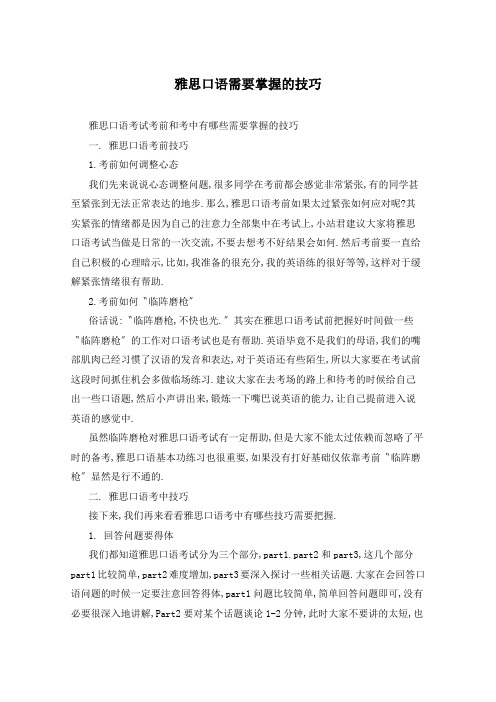
雅思口语需要掌握的技巧雅思口语考试考前和考中有哪些需要掌握的技巧一. 雅思口语考前技巧1.考前如何调整心态我们先来说说心态调整问题,很多同学在考前都会感觉非常紧张,有的同学甚至紧张到无法正常表达的地步.那么,雅思口语考前如果太过紧张如何应对呢?其实紧张的情绪都是因为自己的注意力全部集中在考试上,小站君建议大家将雅思口语考试当做是日常的一次交流,不要去想考不好结果会如何.然后考前要一直给自己积极的心理暗示,比如,我准备的很充分,我的英语练的很好等等,这样对于缓解紧张情绪很有帮助.2.考前如何〝临阵磨枪〞俗话说:〝临阵磨枪,不快也光.〞其实在雅思口语考试前把握好时间做一些〝临阵磨枪〞的工作对口语考试也是有帮助.英语毕竟不是我们的母语,我们的嘴部肌肉已经习惯了汉语的发音和表达,对于英语还有些陌生,所以大家要在考试前这段时间抓住机会多做临场练习.建议大家在去考场的路上和待考的时候给自己出一些口语题,然后小声讲出来,锻炼一下嘴巴说英语的能力,让自己提前进入说英语的感觉中.虽然临阵磨枪对雅思口语考试有一定帮助,但是大家不能太过依赖而忽略了平时的备考,雅思口语基本功练习也很重要,如果没有打好基础仅依靠考前〝临阵磨枪〞显然是行不通的.二. 雅思口语考中技巧接下来,我们再来看看雅思口语考中有哪些技巧需要把握.1. 回答问题要得体我们都知道雅思口语考试分为三个部分,part1.part2和part3,这几个部分part1比较简单,part2难度增加,part3要深入探讨一些相关话题.大家在会回答口语问题的时候一定要注意回答得体,part1问题比较简单,简单回答问题即可,没有必要很深入地讲解,Part2要对某个话题谈论1-2分钟,此时大家不要讲的太短,也不要讲的太过繁琐,最好的办法是稍微放缓语速,在2分钟内表达出足够的内容即可.Part3是要做深入探讨的,所以不能再像part1那样简略回答,要根据问题多说一些内容.所以总的来说,大家在答题的时候要根据问题来回答,回答得体.2. 表现要自然雅思口语答题中除了回答问题要得体外,还要表现的尽可能自然,你表现的越自然,考官也会越自然,对你的印象也会更好一些,如果你太紧张太扭捏,看起来都很难受,留给考官的印象自然也不会好.小站君建议大家在答题的时候可以自然地加入一些肢体动作,适当和考官进行眼神交流,表现出自信满满的状态,这样的交流状态让双方都感觉很舒服,也更容易拿到高分._年9-_月雅思口语范文part1:Reading1.Do you read books related to your profession?Yes, I do. Reading books related to my profession is the only way to getthe information I need when I’m studying major-related courses. Also, readingthese books is an in dispensable way tounder stand the meaning of proper noun.Do you read electronic books?2.What kind of books do you read?As a student who is majoring in economics, I prefer to read books that canbroaden my horizons,especially those inter disciplinary-study books, which canbring my knowledge to the ne_t level and make me further understand mymajor.3.Do you like reading?Of course I do, because I always believe that books are the ladder of humanprogress, especially for young students. Reading is crucial for teenager, because the characters described in the books can be models for the youngreaders. What’s more, Reading makes human wise and full of knowledge. _年9-_月雅思口语范文part3:历史建筑Describe a historical building you have been toYou should say:What it is used for nowWhere it isWhat it looks likeWhat you learned thereAnd e_plain how you feel about the historical building 故宫是我在中国见过最宏伟壮观.历史底蕴最深邃的历史建筑之一.故宫位于北京中轴线的中心,是世界上现存规模最大的木质结构古建筑之一.故宫的前部宫殿宏伟壮丽,象征封建政权至高无上. 我在故宫参观了各类明清代历史文物,这座建筑让我更进一步了解中国历史,让我对祖国两千多年连绵不断的历史传承感到无比自豪.The Forbidden City is one of the grandest and most culturally influentialhistorical works ofarchitecture that I have ever visited in China. Situated inthe center of Beijing, the Forbidden City is now one of the largest wooden workof architecture(木质结构建筑) across the world. As asignificant symbol of ancientroyal constructions(古老的皇家建筑群) in China, the Forbidden City was among the WorldCultural Heritage list and one of the most protected cultural relics in China.Inaddition, it is also one of the most popular tourist attractions in the worldwith over _ milliontourists in total in _. Meanwhile, the architecturecollects a wide array of invaluable cultural relics(文物) once used by Chineseroyalty back in the Ming and Qing dynasty. Preserving and researching theserelics, the Forbidden City serves as a crucial part of the protection ofChinesehistorical culture. Constructions in the Forbidden City are orderly,lined up from north to south and perfectly aligned(完美地对齐分布在) on the left andright side of the central line, making thearchitecture a stunning view to visitors. Palaces in the front part of the Forbidden City aremagnificent,symbolizing the paramount power(至高权力) of the imperial authority back then,whilein contrast, the rear part of the architecture is more compact. In the museum ofthe ForbiddenCity, I have seen a variety of Chinese historical relics andfurther understand the centuries of richChinese history that this architecturehas long preserved. Thanks to the Forbidden city, I canclosely review the longChinese history that makes myself so proud to be Chinese.雅思口语范文如何正确使用雅思口语范文是许多考雅小伙伴都会用到的口语备考资料,那么雅思口语范文应该如何正确雅思口语要用怎样的语速雅思口语用怎样的语速说较合适一文总结了在雅思口语考试中,关于语速的一些相关问题.国内雅思口语压分是真的吗因为国内关于雅思考试压分的声音越来越多,很多考生不得不转战考场,将考试的战场搬向口语冲刺实用雅思口语技巧备考口语勤学苦练,终于到了雅思口语考试实战阶段,如何才能在雅思口语考试现场,保持。
在考雅思口语时应该注意的10点
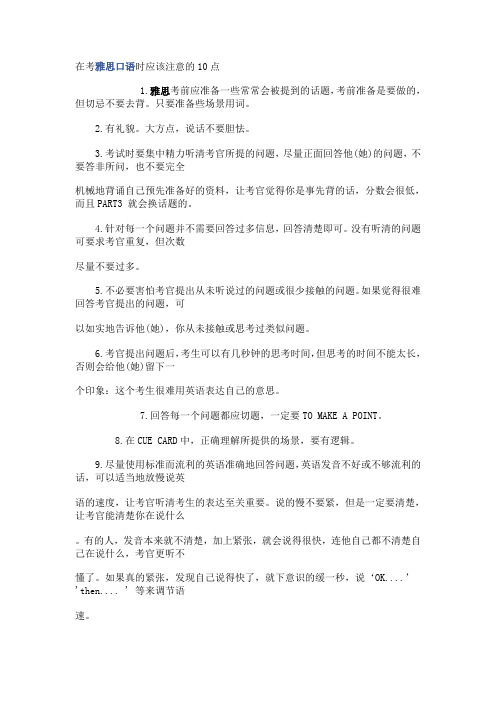
在考雅思口语时应该注意的10点1.雅思考前应准备一些常常会被提到的话题,考前准备是要做的,但切忌不要去背。
只要准备些场景用词。
2.有礼貌。
大方点,说话不要胆怯。
3.考试时要集中精力听清考官所提的问题,尽量正面回答他(她)的问题,不要答非所问,也不要完全机械地背诵自己预先准备好的资料,让考官觉得你是事先背的话,分数会很低,而且PART3 就会换话题的。
4.针对每一个问题并不需要回答过多信息,回答清楚即可。
没有听清的问题可要求考官重复,但次数尽量不要过多。
5.不必要害怕考官提出从未听说过的问题或很少接触的问题。
如果觉得很难回答考官提出的问题,可以如实地告诉他(她),你从未接触或思考过类似问题。
6.考官提出问题后,考生可以有几秒钟的思考时间,但思考的时间不能太长,否则会给他(她)留下一个印象:这个考生很难用英语表达自己的意思。
7.回答每一个问题都应切题,一定要TO MAKE A POINT。
8.在CUE CARD中,正确理解所提供的场景,要有逻辑。
9.尽量使用标准而流利的英语准确地回答问题,英语发音不好或不够流利的话,可以适当地放慢说英语的速度,让考官听清考生的表达至关重要。
说的慢不要紧,但是一定要清楚,让考官能清楚你在说什么。
有的人,发音本来就不清楚,加上紧张,就会说得很快,连他自己都不清楚自己在说什么,考官更听不懂了。
如果真的紧张,发现自己说得快了,就下意识的缓一秒,说‘OK....’ 'then.... ' 等来调节语速。
10.离座时应向考官表示感谢并道再见,争取给考官留下一个好的印象。
雅思口语考试考前急救方法
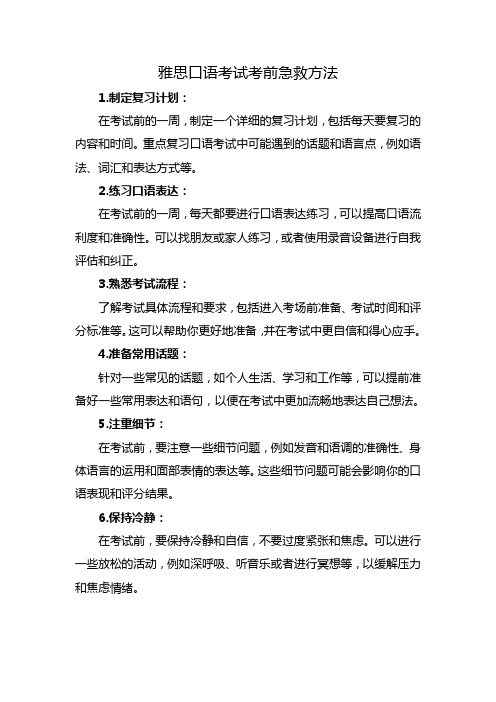
雅思口语考试考前急救方法
1.制定复习计划:
在考试前的一周,制定一个详细的复习计划,包括每天要复习的内容和时间。
重点复习口语考试中可能遇到的话题和语言点,例如语法、词汇和表达方式等。
2.练习口语表达:
在考试前的一周,每天都要进行口语表达练习,可以提高口语流利度和准确性。
可以找朋友或家人练习,或者使用录音设备进行自我评估和纠正。
3.熟悉考试流程:
了解考试具体流程和要求,包括进入考场前准备、考试时间和评分标准等。
这可以帮助你更好地准备,并在考试中更自信和得心应手。
4.准备常用话题:
针对一些常见的话题,如个人生活、学习和工作等,可以提前准备好一些常用表达和语句,以便在考试中更加流畅地表达自己想法。
5.注重细节:
在考试前,要注意一些细节问题,例如发音和语调的准确性、身体语言的运用和面部表情的表达等。
这些细节问题可能会影响你的口语表现和评分结果。
6.保持冷静:
在考试前,要保持冷静和自信,不要过度紧张和焦虑。
可以进行一些放松的活动,例如深呼吸、听音乐或者进行冥想等,以缓解压力和焦虑情绪。
雅思前最后冲刺的窍门是什么
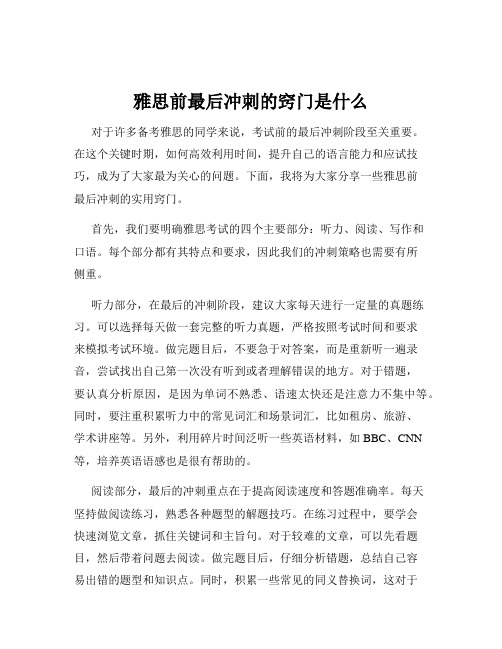
雅思前最后冲刺的窍门是什么对于许多备考雅思的同学来说,考试前的最后冲刺阶段至关重要。
在这个关键时期,如何高效利用时间,提升自己的语言能力和应试技巧,成为了大家最为关心的问题。
下面,我将为大家分享一些雅思前最后冲刺的实用窍门。
首先,我们要明确雅思考试的四个主要部分:听力、阅读、写作和口语。
每个部分都有其特点和要求,因此我们的冲刺策略也需要有所侧重。
听力部分,在最后的冲刺阶段,建议大家每天进行一定量的真题练习。
可以选择每天做一套完整的听力真题,严格按照考试时间和要求来模拟考试环境。
做完题目后,不要急于对答案,而是重新听一遍录音,尝试找出自己第一次没有听到或者理解错误的地方。
对于错题,要认真分析原因,是因为单词不熟悉、语速太快还是注意力不集中等。
同时,要注重积累听力中的常见词汇和场景词汇,比如租房、旅游、学术讲座等。
另外,利用碎片时间泛听一些英语材料,如 BBC、CNN 等,培养英语语感也是很有帮助的。
阅读部分,最后的冲刺重点在于提高阅读速度和答题准确率。
每天坚持做阅读练习,熟悉各种题型的解题技巧。
在练习过程中,要学会快速浏览文章,抓住关键词和主旨句。
对于较难的文章,可以先看题目,然后带着问题去阅读。
做完题目后,仔细分析错题,总结自己容易出错的题型和知识点。
同时,积累一些常见的同义替换词,这对于解答判断题和填空题非常有帮助。
此外,还要注意词汇量的提升,特别是雅思阅读中经常出现的学术词汇。
写作部分,一是要多写多练。
每天至少写一篇大作文和一篇小作文,然后对照范文进行修改和完善。
在写作时,要注意逻辑清晰、观点明确、语法正确。
二是要积累一些常用的句型和短语,以及不同话题的相关词汇和论据。
三是要认真研究雅思写作的评分标准,了解考官的关注点和扣分点。
四是可以请老师或者同学帮忙批改作文,从他人的角度发现自己的不足之处。
口语部分,最后的冲刺阶段要注重开口练习。
可以找一个口语陪练伙伴,或者参加一些口语练习的小组。
每天练习不同的话题,尽量让自己能够流利地表达观点。
雅思口语考前必知内容介绍
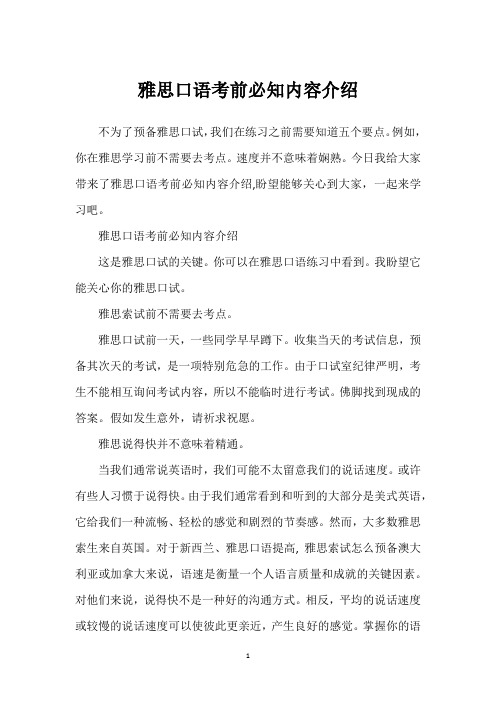
雅思口语考前必知内容介绍不为了预备雅思口试,我们在练习之前需要知道五个要点。
例如,你在雅思学习前不需要去考点。
速度并不意味着娴熟。
今日我给大家带来了雅思口语考前必知内容介绍,盼望能够关心到大家,一起来学习吧。
雅思口语考前必知内容介绍这是雅思口试的关键。
你可以在雅思口语练习中看到。
我盼望它能关心你的雅思口试。
雅思索试前不需要去考点。
雅思口试前一天,一些同学早早蹲下。
收集当天的考试信息,预备其次天的考试,是一项特别危急的工作。
由于口试室纪律严明,考生不能相互询问考试内容,所以不能临时进行考试。
佛脚找到现成的答案。
假如发生意外,请祈求祝愿。
雅思说得快并不意味着精通。
当我们通常说英语时,我们可能不太留意我们的说话速度。
或许有些人习惯于说得快。
由于我们通常看到和听到的大部分是美式英语,它给我们一种流畅、轻松的感觉和剧烈的节奏感。
然而,大多数雅思索生来自英国。
对于新西兰、雅思口语提高, 雅思索试怎么预备澳大利亚或加拿大来说,语速是衡量一个人语言质量和成就的关键因素。
对他们来说,说得快不是一种好的沟通方式。
相反,平均的说话速度或较慢的说话速度可以使彼此更亲近,产生良好的感觉。
掌握你的语速是一个不容忽视的问题。
别取笑考官聪慧的你可能会认为考官究竟是一个人,所以在现场和他保持良好的人际关系是特别重要的,所以你会常常用眼神沟通、微笑、开玩笑等方法为你赢得考官的好士气,盼望你最终能得到更满足的成果。
保守的结果。
然而,语言技能水平是最重要、最紧迫的工作。
我信任,一个面带微笑的考生只能用几句话来沟通,考官在评价中会得出客观的、地下的结论,所以不够肤浅。
雅思口试前5分是第4分,难句无效在语法、流利性和连贯性方面,每一班级对句型中使用的语言概念都有不同程度的解释和强调。
一般来说,在雅思口语中,使用不同形式的句型和语法的力量一方面可以反映一个人的语言。
力量,但对于高级语言标准来说,需要说明的是,雅思口语提高, 雅思索试怎么预备使用不同形式的复句是基于充分的信息和清楚的语音特征,包括自然停顿、重音、声调、升调和降调等很多反映情感的因素。
口语冲刺实用雅思口语技巧
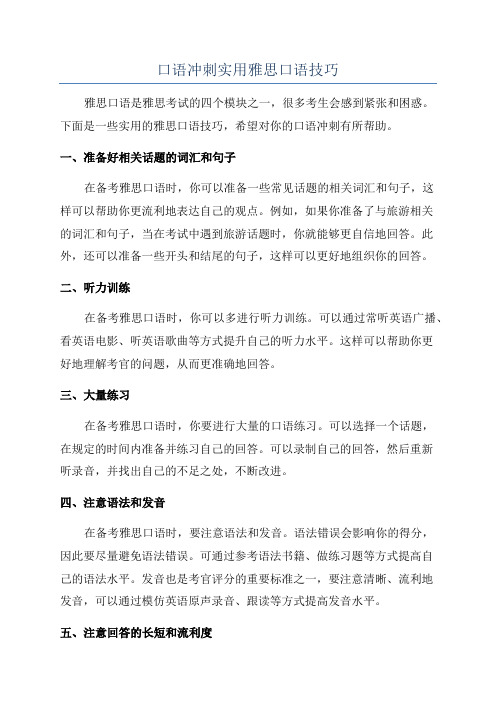
口语冲刺实用雅思口语技巧雅思口语是雅思考试的四个模块之一,很多考生会感到紧张和困惑。
下面是一些实用的雅思口语技巧,希望对你的口语冲刺有所帮助。
一、准备好相关话题的词汇和句子在备考雅思口语时,你可以准备一些常见话题的相关词汇和句子,这样可以帮助你更流利地表达自己的观点。
例如,如果你准备了与旅游相关的词汇和句子,当在考试中遇到旅游话题时,你就能够更自信地回答。
此外,还可以准备一些开头和结尾的句子,这样可以更好地组织你的回答。
二、听力训练在备考雅思口语时,你可以多进行听力训练。
可以通过常听英语广播、看英语电影、听英语歌曲等方式提升自己的听力水平。
这样可以帮助你更好地理解考官的问题,从而更准确地回答。
三、大量练习在备考雅思口语时,你要进行大量的口语练习。
可以选择一个话题,在规定的时间内准备并练习自己的回答。
可以录制自己的回答,然后重新听录音,并找出自己的不足之处,不断改进。
四、注意语法和发音在备考雅思口语时,要注意语法和发音。
语法错误会影响你的得分,因此要尽量避免语法错误。
可通过参考语法书籍、做练习题等方式提高自己的语法水平。
发音也是考官评分的重要标准之一,要注意清晰、流利地发音,可以通过模仿英语原声录音、跟读等方式提高发音水平。
五、注意回答的长短和流利度在备考雅思口语时,要注意回答的长短和流利度。
一般来说,回答要有一定的长度,不能太短。
可以通过添加细节、理由等方式来扩展回答。
同时,要注意流利度,不要出现过多的停顿和口误,可以通过多练习和积累词汇来提高流利度。
六、注意使用复杂句和连接词在备考雅思口语时,要注意使用一些复杂句和连接词,这样可以提高回答的连贯性和流利度。
可以通过学习一些复杂句型和连接词来实现这一点。
例如,可以使用一些表示因果关系、转折关系等的连接词,如"because","however"等。
七、积累常用词汇和短语在备考雅思口语时,要积累一些常用的词汇和短语,这样可以帮助你更准确、流利地表达自己的观点。
雅思口语备考4点注意事项

雅思口语备考4点注意事项雅思备考指南,雅思口语备考4点留意事项,下面我就和大家共享,来观赏一下吧。
备考指南:雅思口语备考4点留意事项雅思口语备考训练中要留意语速许多新晋的雅思索生,面对雅思口语通常刚开头都是背模板,但是小站君要提示的是背诵的回答和你临场的回答是不一样的,往往自己单独背的时候语速都特殊快,而且很流利。
但是临场的时候,尤其是卡片题,很简单语速变慢,然后重复和停顿也常发生。
而且考生在进行回忆的时候,回答速度会变慢,考官会认为你在背诵模板,然后就打断进行下一轮的复习。
因此考生在训练的时候,肯定要留意语速的调整。
我们看下面例子:问题:When did you start to use social networking sites?范文:Let me see. Um, it was probably eight or nine years ago, when I was in Middle school. Back then, we use regard as networking site among students, which was sort of like the Chinese social median of Instagram.这是一个关于社交网络的话题,也是常常会消失的考题,考生或多或少也背过相关的题库。
我们假如把自己背的内容安插进去呢?小站君建议可以在一些承接词和数字上慢下来,例如Let me see; so,8 or 9 years等。
同时我们对强调的内容也要进行降速处理,上述的范文中的重点像use , Back then,需要慢下来。
这样才能让考官觉得你不是在刻意的背诵,而是进行生动形象的表达自己的观点。
雅思口语备考训练中要留意停顿许多考生口语模板背的滚瓜烂熟,而且幸运的是考试也考到了,于是一气呵成的说话,但往往并没有得到高分。
由于考生需要明确的是,口语是一个沟通的过程,需要有抑扬顿挫,也就是所说的停顿。
雅思口语提分的技巧-考试流程-考试注意事项

雅思口语提分的技巧-考试流程-考试注意事项雅思口语要想取得好成绩,必须要做好这些方面:1.回答准确,内容充实;2.用词恰当丰富,时态准确,无显然语法错误;3.逻辑清楚,思维连贯;4.语速适中,发音标准,表达流畅。
1.回答准确,内容充实。
关于考官的每一个问题,考生应当给予丰富的回答,一味回答YES/NO,会使自己陷入被动,给考官太多机会随机发问,反而增加难度。
建议围绕考官问题充分给予生动描述,因果解释,对照对比,罗列总结,这样考官就很难有太多疑问来轰炸你。
2.用词恰当丰富,时态准确,无显然语法错误。
口语注重过去,现在和将来三个时态的准备表达,考生不能掉以轻心。
用词尽量避免重复,多使用描述性词汇,使表达形象生动。
3.逻辑清楚,思维连贯。
口语表达中适当地使用诸如举例,递进,罗列,因果,时间等连接词,会使表达层次分明,清楚易懂。
关于态度偏好类提问,要态度分明,论据与态度相关,否则会让考官感到考生思维不清。
4.语速适中,发音标准,表达流畅。
美丽的发音会使考官眼前一亮,语速太快会给考官带来听力障碍,流利表达是考取高分的关键。
5.目光交流,坚持微笑,自信友善,穿戴正规,用人格魅力赢得考官的青睐。
雅思口试同时也测试了考生的交际本领,提升了考生的交友情商。
2雅思口语考试流程步骤1:简单介绍内容:考官介绍他/她自己,询问考生的姓名,来自哪里,检查考生号。
步骤2:询问基本状况内容:考官问考生一些简单问题,例如住在哪里,学什么专业,做什么工作等。
这些问题可以让你放松并克服紧张情绪。
步骤3:Part 1内容:针对各种话题提一些简短的问题,话题可以包括花、宠物、电视、跳舞等任何方面。
不要只是简单地回答“是〞或“不是〞,也不要用事先背诵好的答案回答。
口试应该像一次谈话。
如果你单凭记忆背诵,考官会打断你,然后问你另外一个问题!步骤4:Part 2内容:给考生一张话题卡和一分钟的准备时间。
考生必须针对这个话题进行两分钟的发言,中途不能出现长时间的停顿。
雅思口语考试技巧
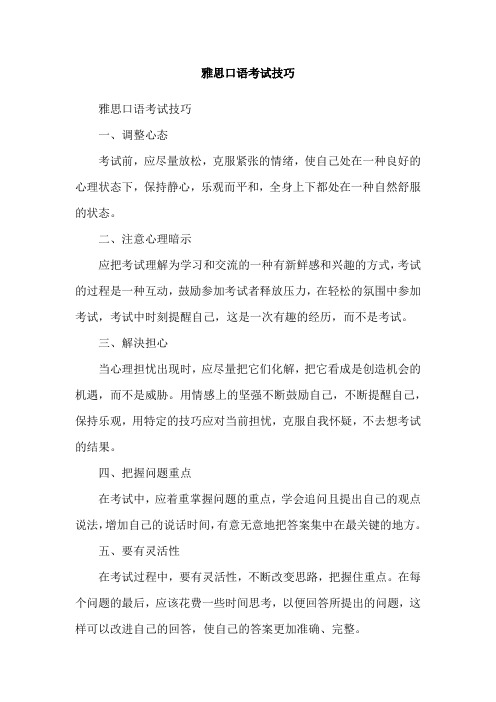
雅思口语考试技巧
雅思口语考试技巧
一、调整心态
考试前,应尽量放松,克服紧张的情绪,使自己处在一种良好的心理状态下,保持静心,乐观而平和,全身上下都处在一种自然舒服的状态。
二、注意心理暗示
应把考试理解为学习和交流的一种有新鲜感和兴趣的方式,考试的过程是一种互动,鼓励参加考试者释放压力,在轻松的氛围中参加考试,考试中时刻提醒自己,这是一次有趣的经历,而不是考试。
三、解決担心
当心理担忧出现时,应尽量把它们化解,把它看成是创造机会的机遇,而不是威胁。
用情感上的坚强不断鼓励自己,不断提醒自己,保持乐观,用特定的技巧应对当前担忧,克服自我怀疑,不去想考试的结果。
四、把握问题重点
在考试中,应着重掌握问题的重点,学会追问且提出自己的观点说法,增加自己的说话时间,有意无意地把答案集中在最关键的地方。
五、要有灵活性
在考试过程中,要有灵活性,不断改变思路,把握住重点。
在每个问题的最后,应该花费一些时间思考,以便回答所提出的问题,这样可以改进自己的回答,使自己的答案更加准确、完整。
【推荐下载】雅思口语考前准备的十条建议-范文word版 (1页)
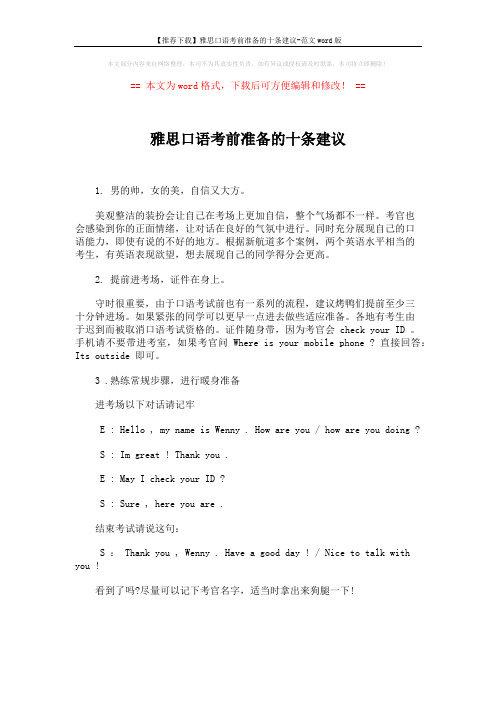
【推荐下载】雅思口语考前准备的十条建议-范文word版本文部分内容来自网络整理,本司不为其真实性负责,如有异议或侵权请及时联系,本司将立即删除!== 本文为word格式,下载后可方便编辑和修改! ==雅思口语考前准备的十条建议1. 男的帅,女的美,自信又大方。
美观整洁的装扮会让自己在考场上更加自信,整个气场都不一样。
考官也会感染到你的正面情绪,让对话在良好的气氛中进行。
同时充分展现自己的口语能力,即使有说的不好的地方。
根据新航道多个案例,两个英语水平相当的考生,有英语表现欲望,想去展现自己的同学得分会更高。
2. 提前进考场,证件在身上。
守时很重要,由于口语考试前也有一系列的流程,建议烤鸭们提前至少三十分钟进场。
如果紧张的同学可以更早一点进去做些适应准备。
各地有考生由于迟到而被取消口语考试资格的。
证件随身带,因为考官会 check your ID 。
手机请不要带进考室,如果考官问 Where is your mobile phone ? 直接回答:Its outside 即可。
3 .熟练常规步骤,进行暖身准备进考场以下对话请记牢E : Hello , my name is Wenny . How are you / how are you doing ?S : Im great ! Thank you .E : May I check your ID ?S : Sure , here you are .结束考试请说这句:S : Thank you , Wenny . Have a good day ! / Nice to talk with you !看到了吗?尽量可以记下考官名字,适当时拿出来狗腿一下!。
雅思口语考试的注意事项(精选)
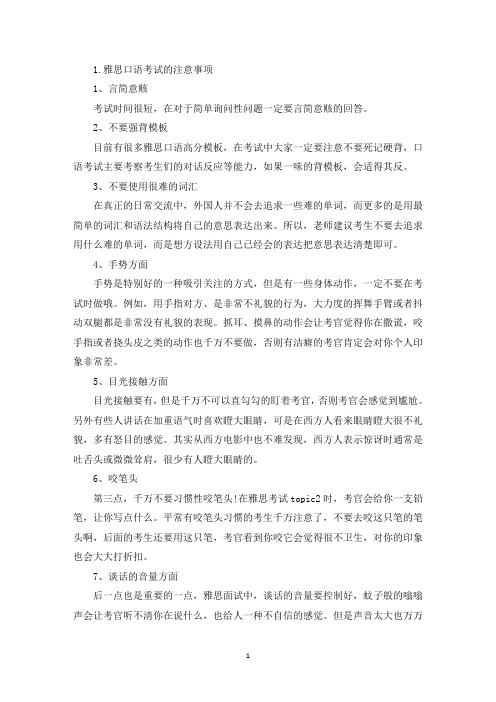
1.雅思口语考试的注意事项1、言简意赅考试时间很短,在对于简单询问性问题一定要言简意赅的回答。
2、不要强背模板目前有很多雅思口语高分模板,在考试中大家一定要注意不要死记硬背,口语考试主要考察考生们的对话反应等能力,如果一味的背模板,会适得其反。
3、不要使用很难的词汇在真正的日常交流中,外国人并不会去追求一些难的单词,而更多的是用最简单的词汇和语法结构将自己的意思表达出来。
所以,老师建议考生不要去追求用什么难的单词,而是想方设法用自己已经会的表达把意思表达清楚即可。
4、手势方面手势是特别好的一种吸引关注的方式,但是有一些身体动作,一定不要在考试时做哦。
例如,用手指对方、是非常不礼貌的行为,大力度的挥舞手臂或者抖动双腿都是非常没有礼貌的表现。
抓耳、摸鼻的动作会让考官觉得你在撒谎,咬手指或者挠头皮之类的动作也千万不要做,否则有洁癖的考官肯定会对你个人印象非常差。
5、目光接触方面目光接触要有,但是千万不可以直勾勾的盯着考官,否则考官会感觉到尴尬。
另外有些人讲话在加重语气时喜欢瞪大眼睛,可是在西方人看来眼睛瞪大很不礼貌,多有怒目的感觉。
其实从西方电影中也不难发现,西方人表示惊讶时通常是吐舌头或微微耸肩,很少有人瞪大眼睛的。
6、咬笔头第三点,千万不要习惯性咬笔头!在雅思考试topic2时,考官会给你一支铅笔,让你写点什么。
平常有咬笔头习惯的考生千万注意了,不要去咬这只笔的笔头啊,后面的考生还要用这只笔,考官看到你咬它会觉得很不卫生,对你的印象也会大大打折扣。
7、谈话的音量方面后一点也是重要的一点,雅思面试中,谈话的音量要控制好,蚊子般的嗡嗡声会让考官听不清你在说什么,也给人一种不自信的感觉。
但是声音太大也万万不可以,雅思口语考试不是朗诵比赛,有些人认为在阐述中突然提高语调会起到强调的效果。
雅思口语考试的误区:事实上,在任何模块,考官都有可能不得不中断考生的讲话。
在第1部分和第3部分,考官会询问考生一系列问题以充分考核考生的口语水平。
雅思口语备考的六个注意事项
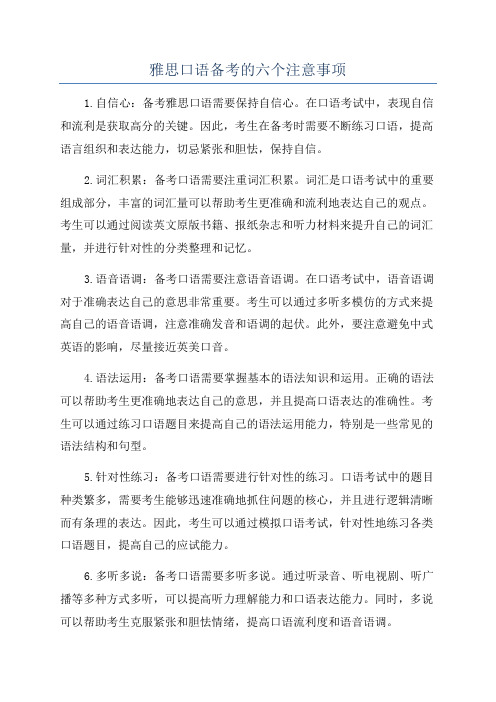
雅思口语备考的六个注意事项1.自信心:备考雅思口语需要保持自信心。
在口语考试中,表现自信和流利是获取高分的关键。
因此,考生在备考时需要不断练习口语,提高语言组织和表达能力,切忌紧张和胆怯,保持自信。
2.词汇积累:备考口语需要注重词汇积累。
词汇是口语考试中的重要组成部分,丰富的词汇量可以帮助考生更准确和流利地表达自己的观点。
考生可以通过阅读英文原版书籍、报纸杂志和听力材料来提升自己的词汇量,并进行针对性的分类整理和记忆。
3.语音语调:备考口语需要注意语音语调。
在口语考试中,语音语调对于准确表达自己的意思非常重要。
考生可以通过多听多模仿的方式来提高自己的语音语调,注意准确发音和语调的起伏。
此外,要注意避免中式英语的影响,尽量接近英美口音。
4.语法运用:备考口语需要掌握基本的语法知识和运用。
正确的语法可以帮助考生更准确地表达自己的意思,并且提高口语表达的准确性。
考生可以通过练习口语题目来提高自己的语法运用能力,特别是一些常见的语法结构和句型。
5.针对性练习:备考口语需要进行针对性的练习。
口语考试中的题目种类繁多,需要考生能够迅速准确地抓住问题的核心,并且进行逻辑清晰而有条理的表达。
因此,考生可以通过模拟口语考试,针对性地练习各类口语题目,提高自己的应试能力。
6.多听多说:备考口语需要多听多说。
通过听录音、听电视剧、听广播等多种方式多听,可以提高听力理解能力和口语表达能力。
同时,多说可以帮助考生克服紧张和胆怯情绪,提高口语流利度和语音语调。
总结起来,雅思口语备考需要保持自信心,注重词汇积累,注意语音语调和语法运用,进行针对性练习,多听多说。
通过坚持不懈的练习和努力,相信考生能够取得好成绩。
雅思口语考前须知
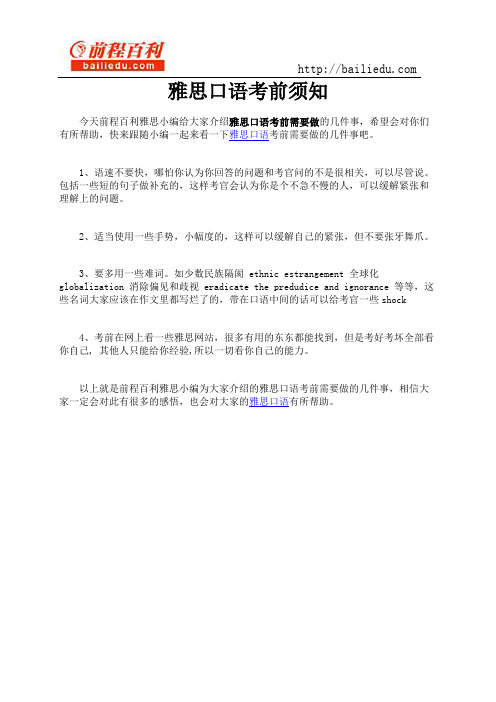
雅思口语考前须知
今天前程百利雅思小编给大家介绍雅思口语考前需要做的几件事,希望会对你们有所帮助,快来跟随小编一起来看一下雅思口语考前需要做的几件事吧。
1、语速不要快,哪怕你认为你回答的问题和考官问的不是很相关,可以尽管说。
包括一些短的句子做补充的,这样考官会认为你是个不急不慢的人,可以缓解紧张和理解上的问题。
2、适当使用一些手势,小幅度的,这样可以缓解自己的紧张,但不要张牙舞爪。
3、要多用一些难词。
如少数民族隔阂 ethnic estrangement 全球化globalization 消除偏见和歧视 eradicate the predudice and ignorance 等等,这些名词大家应该在作文里都写烂了的,带在口语中间的话可以给考官一些shock
4、考前在网上看一些雅思网站,很多有用的东东都能找到,但是考好考坏全部看你自己, 其他人只能给你经验,所以一切看你自己的能力。
以上就是前程百利雅思小编为大家介绍的雅思口语考前需要做的几件事,相信大家一定会对此有很多的感悟,也会对大家的雅思口语有所帮助。
敲黑板!必看的雅思口语考试8点注意事项
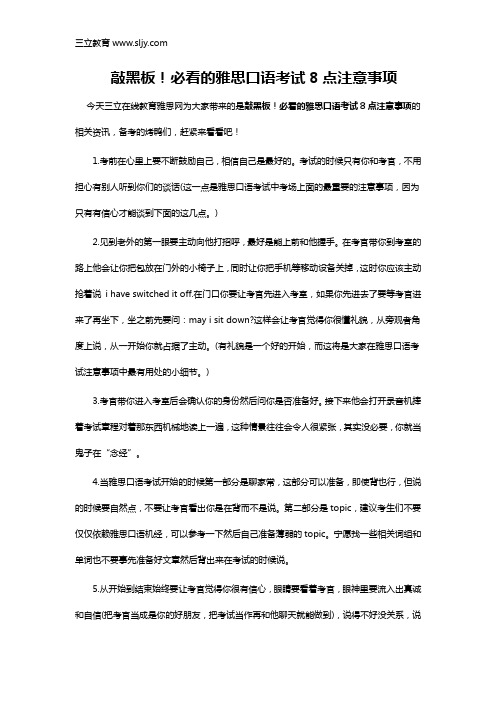
敲黑板!必看的雅思口语考试8点注意事项今天三立在线教育雅思网为大家带来的是敲黑板!必看的雅思口语考试8点注意事项的相关资讯,备考的烤鸭们,赶紧来看看吧!1.考前在心里上要不断鼓励自己,相信自己是最好的。
考试的时候只有你和考官,不用担心有别人听到你们的谈话(这一点是雅思口语考试中考场上面的最重要的注意事项,因为只有有信心才能谈到下面的这几点。
)2.见到老外的第一眼要主动向他打招呼,最好是能上前和他握手。
在考官带你到考室的路上他会让你把包放在门外的小椅子上,同时让你把手机等移动设备关掉,这时你应该主动抢着说i have switched it off.在门口你要让考官先进入考室,如果你先进去了要等考官进来了再坐下,坐之前先要问:may i sit down?这样会让考官觉得你很懂礼貌,从旁观者角度上说,从一开始你就占据了主动。
(有礼貌是一个好的开始,而这将是大家在雅思口语考试注意事项中最有用处的小细节。
)3.考官带你进入考室后会确认你的身份然后问你是否准备好。
接下来他会打开录音机捧着考试章程对着那东西机械地读上一遍,这种情景往往会令人很紧张,其实没必要,你就当鬼子在“念经”。
4.当雅思口语考试开始的时候第一部分是聊家常,这部分可以准备,即使背也行,但说的时候要自然点,不要让考官看出你是在背而不是说。
第二部分是topic,建议考生们不要仅仅依赖雅思口语机经,可以参考一下然后自己准备薄弱的topic。
宁愿找一些相关词组和单词也不要事先准备好文章然后背出来在考试的时候说。
5.从开始到结束始终要让考官觉得你很有信心,眼睛要看着考官,眼神里要流入出真诚和自信(把考官当成是你的好朋友,把考试当作再和他聊天就能做到),说得不好没关系,说错了也不要紧,记得纠正过来,不会影响你的分数。
同时在考试的时候要会用手势来表达自己,这样一方面让考官觉得你很自然,不紧张,另一方面能够弥补你语言上的表达不足。
(这一点就有回到了第一点了,再一次强调了信心在雅思口语考试考场应对中的作用)6.坐在椅子上的姿势不要太拘谨,就像平时上课的时候样子。
雅思口语冲刺注意事项
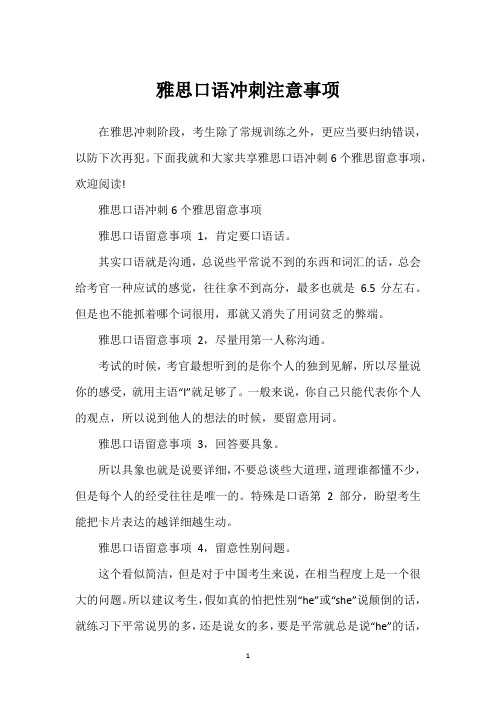
雅思口语冲刺注意事项在雅思冲刺阶段,考生除了常规训练之外,更应当要归纳错误,以防下次再犯。
下面我就和大家共享雅思口语冲刺6个雅思留意事项,欢迎阅读!雅思口语冲刺6个雅思留意事项雅思口语留意事项1,肯定要口语话。
其实口语就是沟通,总说些平常说不到的东西和词汇的话,总会给考官一种应试的感觉,往往拿不到高分,最多也就是 6.5分左右。
但是也不能抓着哪个词很用,那就又消失了用词贫乏的弊端。
雅思口语留意事项2,尽量用第一人称沟通。
考试的时候,考官最想听到的是你个人的独到见解,所以尽量说你的感受,就用主语“I”就足够了。
一般来说,你自己只能代表你个人的观点,所以说到他人的想法的时候,要留意用词。
雅思口语留意事项3,回答要具象。
所以具象也就是说要详细,不要总谈些大道理,道理谁都懂不少,但是每个人的经受往往是唯一的。
特殊是口语第2部分,盼望考生能把卡片表达的越详细越生动。
雅思口语留意事项4,留意性别问题。
这个看似简洁,但是对于中国考生来说,在相当程度上是一个很大的问题。
所以建议考生,假如真的怕把性别“he”或“she”说颠倒的话,就练习下平常说男的多,还是说女的多,要是平常就总是说“he”的话,那考试的时候就把你预备的涉及到人物的资料,都尽量用“he”来表达就OK了。
雅思口语留意事项5,尽早点题。
对于老外来讲,基本都是直来直去的,他们不喜爱拐弯抹角。
所以期望考生能在前2 句话里,做到很到位的点题,也就是平常说的中心句或者论点。
这对于口语考试第2部分尤其重要,不要刷小聪慧,想给考官一点猜想的空间,但是考官是吃这碗饭的,所以还是恳切点的好。
雅思口语留意事项6,分点争论。
这里说的分点是分层次去表达,千万不要想到什么说什么,特殊是第3部分的深化争论部分。
想要做到分层争论,就需要考生具备肯定的生活和社会常识性问题的了解,只有这样才能很好的避开说着说着没话可说的窘境。
2021年9-12月雅思口语part23答案解析:你获奖的经受Describe a time when you won a prize.You should say:When it happenedWhat prize it wasWhy you wanted to win that prizeAnd explain how you felt about that experienceThe time I remember really clearly when I won a prize was when I was in school in a singing contest. It was an annual event, I think beforeSpring Festival… There was a big end-of-year stage performance at school, and in teams or individually, we were encouraged to join a singing or music competition. I decided to do a solo, because I’m really into singing and I’m really good at it. I had singing lessons since I was a kid and I’m a huge fan of performing cover versions of songs and going to KTV and really trying to sing better and better, and more challenging things. I decided that I would sing a song by Adele, called Chasing Pavements, which I find a little bit difficult, actually. I practiced intensely for at least a month, at home and also during rehearsals with a microphone and the proper sound equipment that we would use in the contest. When the big day came I was obviously really, really nervous. I dressed in a shiny metallic long dress and did my hair in wavy sort of curls and wore a silver necklace, so I felt really elegant as I got up on stage, and I think this helped me feel more confident. I thought I sang particularly well on this occasion and I felt really empowered singing in from of hundreds of people and seeing their faces of admiration as I hit some of the high notes spot on. I did make a couple of mistakes, which I was disappointed about, but in the end when the judges all gave their results, I came first!! Yes, I won first prize! I was amazed. I knew I had performed pretty well, but I didn’t think I was the best or that I’d win first prize. I was so proud of myself, and after the show I went for a meal with my parents and a couple of my friends to celebrate. Oh, I forgot tosay what the first prize was!! I was presented, on stage, by the judges, with a large gold trophy in the shape of a musical note, and an android tablet. That was first prize. I was really pleased with that, but to be honest, I was more pleased with coming first and achieving such a great thing, than the actual prize gift for the achievement, if that makes sense.Part31. What kind of prizes do children often win nowadays?I’m not totally sure really. I think it depends on the kind of competition. I think most prizes are quite modest, like trophies for sporting or musical achievements, and perhaps things that are useful for studies like pens and books and electronics. Depending on the school and the area, the prizes can be quite expensive, or quite simple. I think children today are becoming far too spoilt and they are getting increasingly demanding, expecting really expensive prizes and gifts and I think this isn’t really a good trend. So, I imagine there is some pressure for prizes to be more fancy than they were in the past. This seems to be what’s happening these days in other spheres of life anyway – like big company galas and events like this, the prizes can be anything from the latest mobile phone to even a car!! I think the whole culture of prizes and rewards is a little bit unpleasant really, and since I was a kid things have become far too materialistic.2. Are these prizes good for them?I think, as I was saying before, prizes that are useful and practical are good for them, and prizes such as trophies are motivating too. But I think prizes that are just expensive items for the sake of it, or fancy brands, and things like this, simply encourage a culture of consumerism and materialism. I worry today that too many people in my country, especially younger people and children, put too much emphasis on brands and fancy gifts and expensive things, and not enough attention is given to modest forms of encouragement and moral values. So, I think that some prizes are not good for them and force a kind of competition that I do not think is healthy.3. Why do we need to give children prizes?Prizes can be motivating and encouraging so I think that if done in the right way, giving children prizes can reward effort and success and motivate children to try to do better in their studies, sporting activities, musical pursuits or other activities. There should always be a culture of healthy competition in life, and the values of being a good loser should be encouraged as much as those of being a good winner! Children should not have too many prizes too often, but on special occasions or when they have achieved something really worthwhile through personal dedication and effort, then children should be rewarded with prizes and this can be motivating and encouraging.2021年9-12月雅思口语part23答案解析:遗忘做的事Describe a thing you once forgot to do.You should say:What it isWhen you forgot itWhy you forgot itAnd explain how you felt about this experienceI’m sometimes quiet a forgetful person so in fact there are quite a few occasions I recall when I forgot to do something. You see, I can get a bit flustered and stressed out under pressure and it’s on these occasions that I am most likely to forget something. It’s never something really important, though, at least not usually. The one time that I did forget something important was when I was meant to take a birthday present to my brother’s house in Changsha. You see, we were making a family visit there for his birthday and we prepared lots of stuff to take to him. I completely forgot his present, to be honest I don’t know how I could have forgotten it but I did. I got into an argument with my mother you see, a silly argument about something unimportant, just before we were about to leave for the train station, and I completely forgot the present – I left it on the kitchen table at home. I was meant to pack it but I didn’t. I didn’t actually realise that I’d forgotten it until we arrived at his house after the long train journey, and then everyone unpacked their stuff, and I suddenly realized I didn’t have it. I was incredibly embarrassed and feltreally silly. He wasn’t that annoyed about it, but I felt bad and my mother was really angry and gave me a lot of hassle about it. She has gotten quite tired, over the years, with reminding me to do things, and me forgetting you see. So, this was one of the many occasions when I’d forgotten something, yet again, and she lost patience with me. My brother calmed her down – he’s quite a placid character and he is good at smoothing things over – he never seems to get annoyed or take anything too personally, unlike my mother, so he was totally cool about it all. But, still, I felt bad and I said I would post it to him from Beijing, when we got back. This was a year ago, summer last year. In fact, it was during the summer holidays from university.Part31. How can we strengthen our memory?There are a number of ways we can strengthen our memory, actually, most of these include mental activities like puzzles, word games, number games and, of course, reading. Reading novels is very underestimated as a great form of keeping the mind active and sharp – mainly because you’ve got to hold in your mind different characters and what they do. I think that is why kids learn and remember things more than adults sometimes – they’re in school and have to read a lot of different things for different subjects so they are constantly training their minds in that way, and at the same time training their memories. Inschool here you have to memorize a lot you see so some people get really strong at memory-related activities and things. After we leave school I think we lose some of this ability, but that also depends on the kind of jobs we do. If you have a challenging and demanding job juggling lots of different tasks, projects and deadlines, then you’re more likely to keep your memory sharp and focused. If you have a more laid-back job you’re more likely to get out of the habit of remembering things or managing multiple tasks at once and you’re perhaps more inclined to forgetting things easier.2. What kind of people might easily forget things?People who are busy or easily distracted forget things more, I reckon. Also, it’s a personality thing: some people are more absent-minded and it’s just in their nature. Also, people who get stressed more easily, and confused can forget things more often than people who are calm and composed. When you get worried and stressed your mind can get clouded and you’re more likely to put things off or forget to do things, because your mind is occupied and not really working in a clear or organized manner. Also, if you’re tired you’re more likely to suffer from absent-mindedness. It’s important to get a good night’s sleep because that helps the brain to be more clear and focused.3. What kind of things do people often forget?People forget dates, times and appointments sometimes. I’m notsure, I think it depends… let me think… I have friends that often forget their subway card in the office, or forget their phone even in the bathrooms at work. There are all sorts of things like this that people routinely forget. My sister always leaves her car keys in bars and restaurants – almost every time she goes out, we are just leaving the place and she must go back to get her keys from the table we’ve been eating at. I don’t know why she always does this. You see, different people have different habits, both good and bad habits, and some people forget these kind of items because they get distracted in conversation and then absent-minded about their wallet or keys or these kind of things that you take out of your pocket and put down, then forget to pick up again.4. Do you think heavy workload is the reason for forgetting things?Yes, oftentimes this can be a reason why people forget things, most certainly. If people have a lot of work to do they not only have to juggle a lot of different tasks and projects, maybe, but they also might not get chance to have proper rest and sleep, especially if they also have family responsibilities and duties when they get home at night. So, this can cause people to be tired, which, in turn, means that their minds aren’t working properly or very sharply, and they can easily forget things. I think that a good work-life balance is essential for people. In fact, people are more likely to produce better quality work and not get forgetful, ifthey have plenty of rest time and a decent night’s sleep that is largely free of stress or worry.雅思。
- 1、下载文档前请自行甄别文档内容的完整性,平台不提供额外的编辑、内容补充、找答案等附加服务。
- 2、"仅部分预览"的文档,不可在线预览部分如存在完整性等问题,可反馈申请退款(可完整预览的文档不适用该条件!)。
- 3、如文档侵犯您的权益,请联系客服反馈,我们会尽快为您处理(人工客服工作时间:9:00-18:30)。
雅思口语冲刺注意事项在雅思冲刺阶段,考生除了常规训练之外,更应该要归纳错误,以防下次再犯。
下面就和大家分享雅思口语冲刺6个雅思注意事项,欢迎阅读!雅思口语冲刺6个雅思注意事项雅思口语注意事项1,一定要口语话。
其实口语就是交流,总说些平时说不到的东西和词汇的话,总会给考官一种应试的感觉,往往拿不到高分,最多也就是 6.5分左右。
但是也不能抓着哪个词很用,那就又出现了用词贫乏的弊端。
雅思口语注意事项2,尽量用第一人称交流。
考试的时候,考官最想听到的是你个人的独到见解,所以尽量说你的感受,就用主语“I”就足够了。
一般来说,你自己只能代表你个人的观点,所以说到他人的想法的时候,要注意用词。
雅思口语注意事项3,回答要具象。
所以具象也就是说要具体,不要总谈些大道理,道理谁都懂不少,但是每个人的经历往往是唯一的。
特别是口语第2部分,希望考生能把卡片表达的越具体越生动。
雅思口语注意事项4,注意性别问题。
这个看似简单,但是对于中国考生来说,在相当程度上是一个很大的问题。
所以建议考生,如果真的怕把性别“he”或“she”说颠倒的话,就练习下平时说男的多,还是说女的多,要是平时就总是说“he”的话,那考试的时候就把你准备的涉及到人物的资料,都尽量用“he”来表达就OK了。
雅思口语注意事项5,尽早点题。
对于老外来讲,基本都是直来直去的,他们不喜欢拐弯抹角。
所以期望考生能在前2 句话里,做到很到位的点题,也就是平时说的中心句或者论点。
这对于口语考试第2部分尤其重要,不要刷小聪明,想给考官一点猜测的空间,但是考官是吃这碗饭的,所以还是诚恳点的好。
雅思口语注意事项6,分点讨论。
这里说的分点是分层次去表达,千万不要想到什么说什么,特别是第3部分的深入讨论部分。
想要做到分层讨论,就需要考生具备一定的生活和社会常识性问题的了解,只有这样才能很好的避免说着说着没话可说的窘境。
2020年9-12月雅思口语part23答案解析:你获奖的经历Describe a time when you won a prize.You should say:When it happenedWhat prize it wasWhy you wanted to win that prizeAnd explain how you felt about that experienceThe time I remember really clearly when I won a prize was when I was in school in a singing contest. It was an annual event, I think before Spring Festival… There was a big end-of-year stage performance at school, and in teams or individually, we were encouraged to join a singing or music competition. I decided to do a solo, because I’m really into singing and I’m really good at it. I had singing lessons since I was a kid and I’m a huge fan of performing cover versions of songs and going to KTV and really trying to sing better and better, and more challenging things. I decided that I would sing a song by Adele, called Chasing Pavements, which I find a little bit difficult, actually. I practiced intensely for at least a month, at home and also during rehearsals with a microphone and the proper sound equipment that we would use in the contest. When the big day came I was obviously really, really nervous. I dressed in a shiny metallic long dress and did my hair in wavy sortof curls and wore a silver necklace, so I felt really elegant as I got up on stage, and I think this helped me feel more confident. I thought I sang particularly well on this occasion and I felt really empowered singing in from of hundreds of people and seeing their faces of admiration as I hit some of the high notes spot on. I did make a couple of mistakes, which I was disappointed about, but in the end when the judges all gave their results, I came first!! Yes, I won first prize! I was ama zed. I knew I had performed pretty well, but I didn’t think I was the best or that I’d win first prize. I was so proud of myself, and after the show I went for a meal with my parents and a couple of my friends to celebrate. Oh, I forgot to say what the first prize was!! I was presented, on stage, by the judges, with a large gold trophy in the shape of a musical note, and an android tablet. That was first prize. I was really pleased with that, but to be honest, I was more pleased with coming first and achieving such a great thing, than the actual prize gift for the achievement, if that makes sense.Part31. What kind of prizes do children often win nowadays?I’m not totally sure really. I think it depends on the kind of competition. I think most prizes are quite modest, like trophies forsporting or musical achievements, and perhaps things that are useful for studies like pens and books and electronics. Depending on the school and the area, the prizes can be quite expensive, or quite simple. I think children today are becoming far too spoilt and they are getting increasingly demanding, expecting really expensive prizes and gifts and I think this isn’t really a good trend. So, I imagine there is some pressure for prizes to be more fancy than they were in t he past. This seems to be what’s happening these days in other spheres of life anyway – like big company galas and events like this, the prizes can be anything from the latest mobile phone to even a car!! I think the whole culture of prizes and rewards is a little bit unpleasant really, and since I was a kid things have become far too materialistic.2. Are these prizes good for them?I think, as I was saying before, prizes that are useful and practical are good for them, and prizes such as trophies are motivating too. But I think prizes that are just expensive items for the sake of it, or fancy brands, and things like this, simply encourage a culture of consumerism and materialism. I worry today that too many people in my country, especially younger people and children, put too much emphasis on brands and fancy gifts andexpensive things, and not enough attention is given to modest forms of encouragement and moral values. So, I think that some prizes are not good for them and force a kind of competition that I do not think is healthy.3. Why do we need to give children prizes?Prizes can be motivating and encouraging so I think that if done in the right way, giving children prizes can reward effort and success and motivate children to try to do better in their studies, sporting activities, musical pursuits or other activities. There should always be a culture of healthy competition in life, and the values of being a good loser should be encouraged as much as those of being a good winner! Children should not have too many prizes too often, but on special occasions or when they have achieved something really worthwhile through personal dedication and effort, then children should be rewarded with prizes and this can be motivating and encouraging.2020年9-12月雅思口语part23答案解析:忘记做的事Describe a thing you once forgot to do.You should say:What it isWhen you forgot itWhy you forgot itAnd explain how you felt about this experienceI’m sometimes quiet a forgetful person so in fact there are quite a few occasions I recall when I forgot to do something. You see, I can get a bit flustered and stressed out under pressure and it’s on these occasions that I am most likely to forget something. It’s never something really important, though, at least not usually. The one time that I did forget something important was when I was meant to take a birthday present to my brother’s house in Changsha. You see, we were making a family visit there for his birthday and we prepared lots of stuff to take to him. I completely forgot his present, to be honest I don’t know how I could have forgotten it but I did. I got into an argument with my mother you see, a silly argument about something unimportant, just before we were about to leave for the train station, and I completely forgot the present – I left it on the kitchen table at home. I was meant to pack it but I didn’t. I didn’t actually realise that I’d forgotten it until we arrived at his house after the long train journey, and then everyone unpacked their stuff, and I suddenly realized I didn’t have it. I was incredibly embarrassed and felt really silly. He wasn’t thatannoyed about it, but I felt bad and my mother was really angry and gave me a lot of hassle about it. She has gotten quite tired, over the years, with reminding me to do things, and me forgetting you see. So, this was one of the many occasions when I’d forgotten something, yet again, and she lost patience with me. My brother calmed her down –he’s quite a placid character and he is good at smoothing things over – he never seems to get annoyed or take anything too personally, unlike my mother, so he was totally cool about it all. But, still, I felt bad and I said I would post it to him from Beijing, when we got back. This was a year ago, summer last year. In fact, it was during the summer holidays from university.Part31. How can we strengthen our memory?There are a number of ways we can strengthen our memory, actually, most of these include mental activities like puzzles, word games, number games and, of course, reading. Reading novels is very underestimated as a great form of keeping the mind active and sharp –mainly because you’ve got to hold in your mind different characters and what they do. I think that is why kids learn and remember things more than adults sometimes –they’re in school and have to read a lot of different things for different subjects sothey are constantly training their minds in that way, and at the same time training their memories. In school here you have to memorize a lot you see so some people get really strong at memory-related activities and things. After we leave school I think we lose some of this ability, but that also depends on the kind of jobs we do. If you have a challenging and demanding job juggling lots of different tasks, projects and deadlines, then you’re more likely to keep your memory sharp and focused. If you have a more laid-back job you’re more likely to get out of the habit of remembering things or managing multiple tasks at once and you’re perhaps more inclined to forgetting things easier.2. What kind of people might easily forget things?People who are busy or easily distracted forget things more, I reckon. Also, it’s a personality thing: some people are more absent-minded and it’s just in th eir nature. Also, people who get stressed more easily, and confused can forget things more often than people who are calm and composed. When you get worried and stressed your mind can get clouded and you’re more likely to put things off or forget to do things, because your mind is occupied and not really working in a clear or organized manner. Also, if you’re tired you’re more likely to suffer from absent-mindedness.It’s important to get a good night’s sleep because that helps the brain to be more clear and focused.3. What kind of things do people often forget?People forget dates, times and appointments sometimes. I’m not sure, I think it depends… let me think… I have friends that often forget their subway card in the office, or forget their phone even in the bathrooms at work. There are all sorts of things like this that people routinely forget. My sister always leaves her car keys in bars and restaurants – almost every time she goes out, we are just leaving the place and she must go back to get her keys from the table we’ve been eating at. I don’t know why she always does this. You see, different people have different habits, both good and bad habits, and some people forget these kind of items because they get distracted in conversation and then absent-minded about their wallet or keys or these kind of things that you take out of your pocket and put down, then forget to pick up again.4. Do you think heavy workload is the reason for forgetting things?Yes, oftentimes this can be a reason why people forget things, most certainly. If people have a lot of work to do they not only have to juggle a lot of different tasks and projects, maybe, but they alsomight not get chance to have proper rest and sleep, especially if they also have family responsibilities and duties when they get home at night. So, this can cause people to be tired, which, in turn, means that their minds aren’t working properly or very sharply, and they can easily forget things. I think that a good work-life balance is essential for people. In fact, people are more likely to produce better quality work and not get forgetful, if they have plenty of rest time and a decent night’s sleep that is largely free of stress or worry.雅思。
